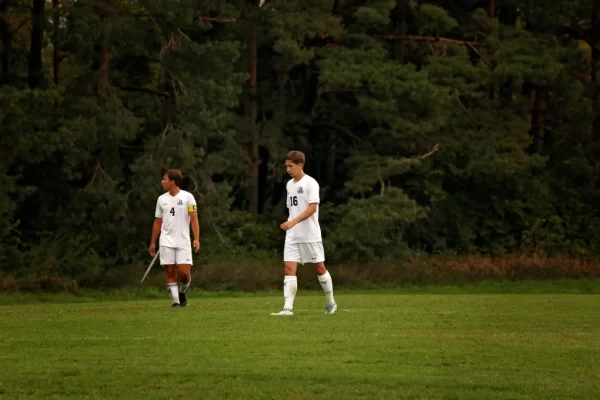As many students at the Academies can attest, Facebook seems to be an indispensable part of the average teenager’s life. From status updates and video postings to event invitations and picture comments, the social networking site has had a dramatic impact on the way our generation associates with others. Most Facebook connections are between people who know each other and are friends in real life — or at least that was the original idea. While Facebook began as — and certainly still is — a way for friends to keep tabs on each other’s lives, the site also allows users to connect with people they don’t know and have never met. Two strangers meeting online is not necessarily a problem, as long as both people are honest about their identities and intentions. The trouble arises, however, when the person portrayed on the profile isn’t the same person typing away on the computer. Depending on how it’s used, Facebook can be a relatively innocuous site, or — as the Academy community is now well aware — a Pandora’s box of legal and moral quandaries that bring into question the nebulous boundaries of privacy.
Although I can’t go into detail about the recent Facebook incident involving several Academy students that occurred in late October, the events that transpired — both online and offline — raised serious concerns about privacy and personal identity in the virtual world in which more than 500 million people have a presence. These and others issues that have been raised can all be connected to the idea of boundaries: where they are, how to define them, and what to do when they are crossed.
On the Facebook site, there is a page called “Facebook Principles” (http://www.facebook.com/principles.php), on which the company presents ten guidelines that outline the behavior users should follow. Among these principles is “Fundamental Equality,” “Common Welfare,” “Freedom to Share and Connect,” and “Free Flow of Information.” Out of context, these sound quite a bit like the basic facets of any democracy. In fact, the word “freedom” — a value emphasized in our own country — is used six times in the document (“free” is also used twice). Facebook also has a “Statement of Rights and Responsibilities” (http://www.facebook.com/terms.php?ref=pf) which says things like “You will not bully, intimidate, or harass any user,” “You will not use Facebook to do anything unlawful, misleading, malicious, or discriminatory,” “We respect other people’s rights, and expect you to do the same,” and “You will not post content or take any action on Facebook that infringes or violates someone else’s rights or otherwise violates the law.” Other than some internet- and site-specific regulations, the page is basically asking users to be nice and respect others — the same thing most nations expect of their citizens.
Facebook is just like any other society — albeit an online one — and its users should abide by the same moral codes that they follow in real life. The only difference is that Facebook is an Internet-based community, which makes it easier for people to bend or break the rules, and harder to tell when they’re doing so. Furthermore, the boundaries between right and wrong always seem far more blurry online than they do in reality, making it not only more difficult to know when someone else has crossed one of these obscure lines, but also tricky to realize when you yourself have gone too far. Part of the problem is the nature of the Internet itself: it’s all too easy to get caught up in the seemingly endless and liberating possibilities of the virtual world, and forget that actions in the virtual world still have consequences in the real one. What’s more, the ostensible protection that the anonymity of the Internet confers on users often lulls them into an imagined and dangerous sense of immunity. While the smoke screen of html may seem like a protective barrier between actions and repercussions, it is actually more like a catalyst for unusually malicious actions, which people wouldn’t dare to perform in the real world for fear of exposure.
However, the aforementioned issue isn’t entirely a result of users’ faults; Facebook itself also deserves at least some of the blame. Although it certainly was not Facebook’s intention to create the most accessible medium for gossip and teenage drama of the decade, that arguably has been the result. To be sure, Facebook and its associated programs (most notably Formspring, an application that allows people to anonymously post a comment on others’ walls) can and have been used for worthy and valuable purposes; however, those same tools have also been used to spite, insult, and provoke others. The nature of Facebook itself makes it easy for users to express their hatred for and to another person, and thus users are saddled with the extra responsibility of taking the initiative to avoid such unacceptable behavior.
In the case of the fake Facebooks, someone, at some point, clearly crossed a boundary that should not have been crossed. I don’t have the authority to say whether it was a social, moral, or legal boundary, whether that person knew he or she had gone too far, and what the consequences were. While, in retrospect, it seems quite obvious that a line — albeit a vague and ill-defined one — was far overstepped, the person responsible may not have realized that what he or she was doing was wrong until things had gone too far. Consider the following examples.
To make the fake Facebooks, someone had taken pictures from students’ real profiles and had created profile pages featuring these photos. Clearly, this was wrong; the students did not give permission for their photos to be taken and reposted. Then, a few weeks ago, I took a picture of my friend that I then posted on my Facebook page. I later saw that said friend had taken that photo and had made it her profile picture. Obviously I wasn’t mad at her — in fact, I was flattered that she liked my photo so much that she wanted to post it on her own page — and I doubt that anyone would charge her with any wrongdoing. Technically, however, one could argue that she took my property and used it without my permission — the same thing that happened with the photos on the fake Facebooks. So what’s the difference between the two cases? What if someone had created just one fake Facebook page for one person — again, using that person’s picture without his or her permission — but nothing more? Would that be a little creepy? Sure. Would it be morally wrong? Hard to say. So where are the lines between normal, creepy, morally wrong, and illegal? (I don’t want to suggest that the fake Facebooks were illegal — I have no idea what the verdict on that was — but I think most people would agree that what happened was morally wrong). Honestly, I don’t know, and I doubt very many people do. These boundaries are at the core of online privacy disputes, and our generation will be responsible for defining and shaping future guidelines from the current haze.
Looking back, what lessons should be taken from everything that has happened? My suggestion is this: have some common sense. Be aware that your actions have consequences, be nice to other people, be respectful, and don’t do something to others you wouldn’t want done to you. Yes, the same rules that apply in real life also apply on Facebook, and yes, you probably learned about all these things in kindergarten.



